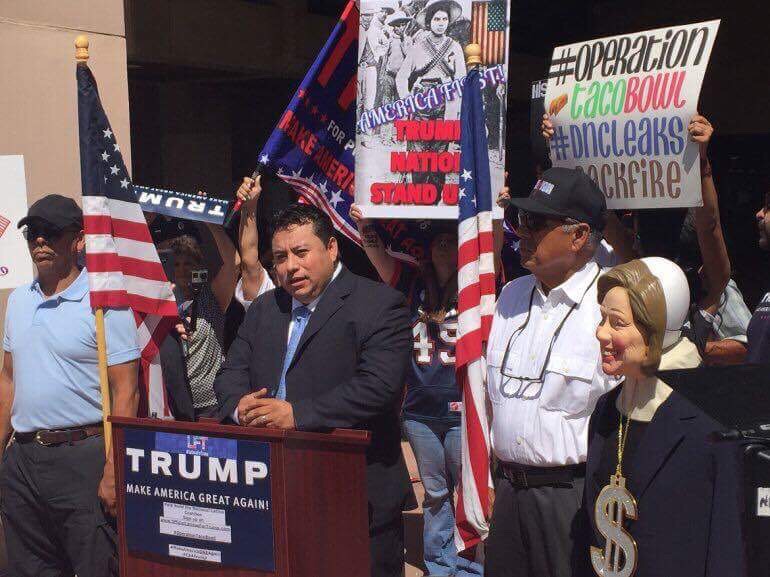Latino voters’ impact remains unclear nearly a year after 2016 election

With the 2018 mid-term elections a little more than a year away, the impact of the Latino vote remains uncertain.
While exit polls of the presidential race showed the majority of Latinos favored Hillary Clinton (66 percent), a significant number of Latinos voted for Donald Trump — despite his controversial rhetoric about some members of the Hispanic community.
Seven months into his presidency, Trump’s campaign promises of tougher immigration laws and the construction of a “big, beautiful powerful wall” on the Mexican border have not yet been fulfilled.
But immigration raids and deportations are up, and DACA, or the Deferred Action for Childhood Arrivals program, has ended.
Trump’s Latino supporters are finding they are not exempt from the president’s threats to kick undocumented immigrants out of the country. Such was the case for Jorge Ramirez, a California Christian minister currently awaiting deportation after being detained by federal immigration authorities outside his home. He encouraged his U.S.-born daughter to vote for the billionaire businessman.
Some of those who voted for Trump are now finding his policies can be as unfriendly as his opponents feared prior to the election.
As the number of deportations surge and the administration ends DACA, some Republican Party activists fear they will have a hard time finding support among skeptical Latino voters who fear for themselves, their families or their friends.
“Something that would make my job easier is if Donald Trump would include the accomplishments of the legal immigrants and Hispanics that are here rather than to focus so much on the very small number of illegal immigrants,” said Marco Gutierrez, co-founder of “Latinos for Trump,” an online organization boasting at least 20,000 members.
For Gutierrez, who went viral last year for his “taco trucks in every corner” remark during a cable news interview, Latino Republicans need solid leadership to stay united on conservative policy initiatives.
“There’s no direction because now you’re starting to see a lot of division because of the 2018 (election),” Gutierrez said.
Gutierrez said younger Latino voters are key to the upcoming election.
“It doesn’t matter what side they’re on, but it’s important for them to participate in local politics,” Gutierrez said.
Millenials are now the largest generation of Americans, giving them a decisive edge in future elections for both political parties, he added.
Democrats are also mobilizing. The Latino Victory project, a nonpartisan political organization dedicated to putting more Hispanics in office and raising their donor bases, said “young people have taken notice” and are more willing to participate.
“We’ll begin to play a bigger role in states people don’t typically associate with the Latino community, places like Georgia and Iowa,” the Latino Victory Project said in a statement, referring to the 2018 election.
Yet when talking about the strategy to reach out to the Latino community, neither party seems to have a plan.
Democrats say the negative campaign rhetoric from the Republican presidential nominee became the working policy of a White House that had demonized undocumented immigrants and Latinos, writ large. It will be President Trump’s own words, Democrats said, that will be their best tool for the 2018 election.
“Democrats continue to speak out against President Trump’s attacks on Latinos and other minorities,” the project said. “However, some Democrats have been tempted to tone down their message on the issues affecting communities of color for fear of alienating white working-class voters.
They’ve got to remember that the next generation of voters is the most diverse in U.S. history,” the organization added.

Isabel Sanchez has wanted to be a journalist since her youth.
Today, Sanchez is pursuing a master’s degree in journalism at Syracuse University in upstate New York. There she is learning about more than the craft of news writing — she is also learning about American culture.
Originally from Venezuela, Sanchez studied at the Rafael Belloso Chacín in Maracaibo and worked at a local television station before coming to the United States when she was 23.
Sanchez prefers to tell stories with video, which, she said, is the best way to capture someone’s attention.
Her dream job is to be an international news correspondent that will allow her to continue traveling, as she has done for much of her life. Sanchez has previously made stops throughout Latin America, including Argentina and Colombia.
Prior to coming to Anaheim, she had an internship in Providence, Rhode Island, with local news station, WPRI.